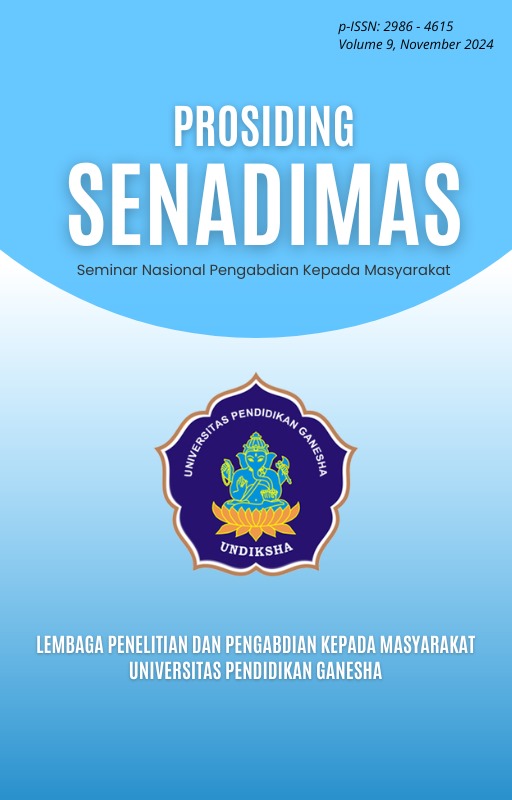PELATIHAN DAN PENDAMPINGAN INTEGRASI APLIKASI PRAKTIS ARTIFICIAL INTELLIGENCE (AI) DALAM PEMBELAJARAN BAGI PARA GURU SKB
Abstrak
Artificial Intelligence (AI) merupakan sebuah konsep dan teknologi yang telah mampu mengubah cara kita hidup dan berinteraksi dengan dunia. AI dapat diartikan sebagai kemampuan mesin untuk meniru perilaku manusia yang cerdas, seperti belajar, menalar, dan memecahkan masalah. Dalam konteks pendidikan, AI dapat digunakan untuk membantu siswa dalam memahami materi pelajaran, mengidentifikasi kelemahan individual, dan memberikan rekomendasi yang personal. Selain itu, AI juga dapat digunakan untuk membuat kurikulum yang disesuaikan dengan kebutuhan siswa, membuat pengujian yang adaptif, dan memberikan umpan balik secara instan. Tahapan yang ditempuh pada PkM ini adalah 1) persiapan, 2) pelaksanaan pelatihan, 3) pelaksanaan pendampingan, dan 4) evaluasi. Melalui pelatihan dan pendampingan integrasi aplikasi praktis artificial intelligence (AI) dalam pembelajaran diharapkan dapat menambah pengetahuan dan keterampilan para Guru Pendidikan Non Formal di Sanggar Kegiatan Belajar (SKB) Kabupaten Buleleng-Bali dalam meningkatkan keterlibatan dan prestasi siswa.
Referensi
Br Sembiring, S. N., Winata, H., & Kusnasari, S. (2022). Pengelompokan Prestasi Siswa Menggunakan Algoritma K-Means. Jurnal Sistem Informasi Triguna Dharma (JURSI TGD), 1(1), 31. https://doi.org/10.53513/jursi.v1i1.4784
Chen, X., Xie, H., Zou, D., & Hwang, G. J. (2020, January 1). Application and theory gaps during the rise of Artificial Intelligence in Education. Computers and Education: Artificial Intelligence, Vol. 1. Elsevier B.V. https://doi.org/10.1016/j.caeai.2020.100002
Dhaliwal, N., Simpson, F., & Kim-Sing, A. (2018). Self-paced online learning modules for pharmacy practice educators: Development and preliminary evaluation. Currents in Pharmacy Teaching and Learning, 10(7), 964–974. https://doi.org/10.1016/j.cptl.2018.04.017
Habeahan, N. L. S., Leba, S. M. R., Wahyuniar, W., Tarigan, D. B., Asaloei, S. I., & Werang, B. R. (2022). Online teaching in an Indonesian higher education institution: Student’s perspective. International Journal of Evaluation and Research in Education, 11(2), 580–587. https://doi.org/10.11591/ijere.v11i2.21824
Hao, S., Dennen, V. P., & Mei, L. (2017). Influential factors for mobile learning acceptance among Chinese users. Educational Technology Research and Development, 65(1), 101–123. https://doi.org/10.1007/s11423-016-9465-2
Hastungkara, D. P., & Triastuti, E. (2019). Application of e-learning and artificial intelligence in education systems in Indonesia. Anglo-Saxon: Journal of the English Language Education Study Program, 10(2), 117–133.
Holmes, W., Anastopoulou, S., Schaumburg, H., & Mavrikis, M. (2018). Technology-enhanced personalised learning: Untangling the evidence.
Hutagalung, J. (2022). Pemetaan Siswa Kelas Unggulan Menggunakan Algoritma K-Means Clustering. JATISI (Jurnal Teknik Informatika Dan Sistem Informasi), 9(1), 606–620. https://doi.org/10.35957/jatisi.v9i1.1516
Hwang, G. J., Xie, H., Wah, B. W., & Gašević, D. (2020, January 1). Vision, challenges, roles and research issues of Artificial Intelligence in Education. Computers and Education: Artificial Intelligence, Vol. 1. Elsevier B.V. https://doi.org/10.1016/j.caeai.2020.100001
Istenič Starčič, A. (2019). Human learning and learning analytics in the age of artificial intelligence. British Journal of Educational Technology, 50(6), 2974–2976. https://doi.org/10.1111/bjet.12879
Mambu, J. G. Z., Pitra, D. H., Rizki, A., Ilmi, M., Nugroho, W., Leuwol, N. V, … Saputra, A. (2023). Pemanfaatan Teknologi Artificial Intelligence (AI) Dalam Menghadapi Tantangan Mengajar Guru di Era Digital. Journal on Education, 06(01), 2689–2698.
Núñez-Canal, M., de Obesso, M. de las M., & Pérez-Rivero, C. A. (2022). New challenges in higher education: A study of the digital competence of educators in Covid times. Technological Forecasting and Social Change, 174, 121270. https://doi.org/10.1016/j.techfore.2021.121270
Ouyang, F., & Jiao, P. (2021). Artificial intelligence in education: The three paradigms. Computers and Education: Artificial Intelligence, 2. https://doi.org/10.1016/j.caeai.2021.100020
Poondej, C., & Lerdpornkulrat, T. (2019). Gamification in E-learning: A moodle implementation and its effect on student engagement and performance. Interactive Technology and Smart Education, 17(1), 56–66. https://doi.org/10.1108/ITSE-06-2019-0030
Priyahita, R. (2020). The Utilization of E-Learning and Artificial Intelligence in the Development of Education System in Indonesia. Proceedings of the 2nd Jogjakarta Communication Conference (JCC 2020), 263–268. Paris, France: Atlantis Press. https://doi.org/10.2991/assehr.k.200818.061
Rintaningrum, R. (2023). Technology integration in English language teaching and learning: Benefits and challenges. Cogent Education, 10(1). https://doi.org/10.1080/2331186X.2022.2164690
Rowe, M. (2019). Shaping Our Algorithms Before They Shape Us. In J. Knox, Y. Wang, & M. Gallagher (Eds.), Artificial Intelligence and Inclusive Education: Speculative Futures and Emerging Practices (pp. 151–163). Singapore: Springer Singapore. https://doi.org/10.1007/978-981-13-8161-4_9
Rusmiyanto, Huriati, N., Fitriani, N., Tyas, N. K., Rofi’i, A., & Sari, M. N. (2023). The Role Of Artificial Intelligence (AI) In Developing English Language Learner’s Communication Skills. 2023 14th International Conference on Computing Communication and Networking Technologies, ICCCNT 2023, 06(01), 750–757. https://doi.org/10.1109/ICCCNT56998.2023.10307203
Saputra, E. A., & Nataliani, Y. (2021). Analisis Pengelompokan Data Nilai Siswa untuk Menentukan Siswa Berprestasi Menggunakan Metode Clustering K-Means. Journal of Information Systems and Informatics, 3(3), 424–439. https://doi.org/10.51519/journalisi.v3i3.164
Suartama, I. K., Setyosari, P., Sulthoni, S., & Ulfa, S. (2020). Development of Ubiquitous Learning Environment Based on Moodle Learning Management System. International Journal of Interactive Mobile Technologies (IJIM), 14(14), 182–204. https://doi.org/10.3991/ijim.v14i14.11775
Suartama, I Kadek, Sudarma, I. K., Sudatha, I. G. W., Sukmana, A. I. W. I. Y., & Susiani, K. (2024). Student engagement and academic achievement: the effect of gamification on case and project-based online learning. Journal of Education and Learning (EduLearn), 18(3), 976–990. https://doi.org/10.11591/edulearn.v18i3.21349
Suartama, I Kadek, Triwahyuni, E., & Suranata, K. (2022). Context-Aware Ubiquitous Learning Based on Case Methods and Team-Based Projects: Design and Validation. Education Sciences, 12(11), 802. https://doi.org/10.3390/EDUCSCI12110802
Suartama, I.K., Mahadewi, L. P. P., Divayana, D. G. H., & Yunus, M. (2022). ICARE Approach for Designing Online Learning Module Based on LMS. International Journal of Information and Education Technology, 12(4), 305–312. https://doi.org/10.18178/ijiet.2022.12.4.1619
Sumiharsono, R., Triwahyuni, E., & Suartama, I. K. (2021). Design considerations for ubiquitous learning environment. Turkish Journal of Computer and Mathematics Education, Vol. 12.
Valverde-Berrocoso, J., del Carmen Garrido-Arroyo, M., Burgos-Videla, C., & Morales-Cevallos, M. B. (2020, June 1). Trends in educational research about e-Learning: A systematic literature review (2009-2018). Sustainability (Switzerland), Vol. 12. MDPI. https://doi.org/10.3390/su12125153
Unduhan
Diterbitkan
Terbitan
Bagian
Lisensi
Hak Cipta (c) 2024 Seminar Nasional Pengabdian kepada Masyarakat

Artikel ini berlisensiCreative Commons Attribution-ShareAlike 4.0 International License.



